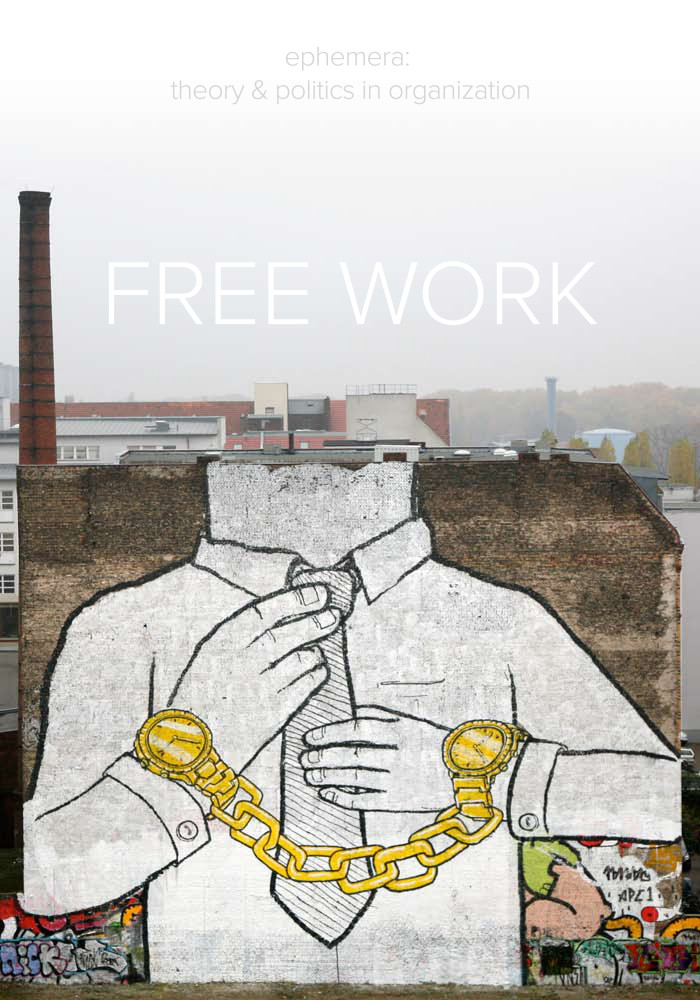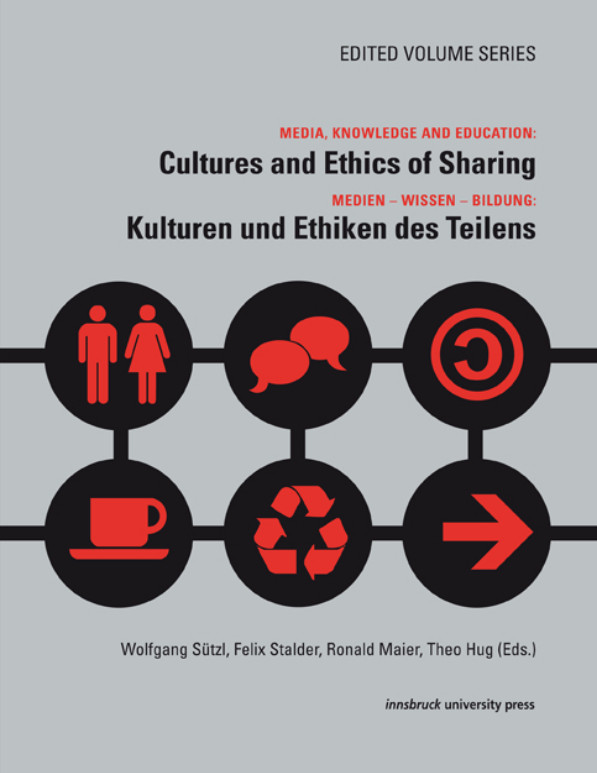Ephemera: Theory & Politics in Organization: The Free Work Issue (2013)
Filed under journal | Tags: · art, ethics, labour, theory, work

The relationship between freedom and work is a complex one. For some, they are considered opposites: ‘true’ freedom is possible only once the necessity of work is removed, and a life of luxury attained. For others, work itself provides an opportunity to achieve a sense of freedom and authenticity. In recent years for example, advances in human resource management have promoted hard work, a deep sense of commitment to one’s job, and the acceptance of working conditions that are ostensibly exploitative, as offering the promise of freedom. Recent corporate and entrepreneurial celebrations of playfulness also provide examples of the deep entanglement of contemporary forms of knowledge work with ideals of freedom.
In this issue of ephemera, our contributors inquire into the relation between freedom and work. They ask, for example, whether it is even possible to free oneself from ideals of freedom? Or is the fantasy of an imagined place of freedom, the utopia in which no work taints our lives, simply too prevalent? It may be the case that in contemporary life, we fool ourselves yet further when we ask for freedom within our working life. But can we free ourselves from the very prospect of freedom?
Volume 13, Number 1
Publisher ephemera editorial collective in association with MayFlyBooks, February 2013
Creative Commons Attribution-Noncommercial-No Derivative 3.0 Unported license
ISBN 9781906948160
201 pages
PDF
View online (HTML and PDF articles)
Back issues
Karen Barad: Meeting the Universe Halfway: Quantum Physics and the Entanglement of Matter and Meaning (2007)
Filed under book | Tags: · agency, agential realism, apparatus, epistemology, ethics, materialism, ontology, philosophy, physics, posthumanism, quantum mechanics, quantum physics, science

“Meeting the Universe Halfway is an ambitious book with far-reaching implications for numerous fields in the natural sciences, social sciences, and humanities. In this volume, Karen Barad, theoretical physicist and feminist theorist, elaborates her theory of agential realism. Offering an account of the world as a whole rather than as composed of separate natural and social realms, agential realism is at once a new epistemology, ontology, and ethics. The starting point for Barad’s analysis is the philosophical framework of quantum physicist Niels Bohr. Barad extends and partially revises Bohr’s philosophical views in light of current scholarship in physics, science studies, and the philosophy of science as well as feminist, poststructuralist, and other critical social theories. In the process, she significantly reworks understandings of space, time, matter, causality, agency, subjectivity, and objectivity.
In an agential realist account, the world is made of entanglements of “social” and “natural” agencies, where the distinction between the two emerges out of specific intra-actions. Intra-activity is an inexhaustible dynamism that configures and reconfigures relations of space-time-matter. In explaining intra-activity, Barad reveals questions about how nature and culture interact and change over time to be fundamentally misguided. And she reframes understanding of the nature of scientific and political practices and their “interrelationship.” Thus she pays particular attention to the responsible practice of science, and she emphasizes changes in the understanding of political practices, critically reworking Judith Butler’s influential theory of performativity. Finally, Barad uses agential realism to produce a new interpretation of quantum physics, demonstrating that agential realism is more than a means of reflecting on science; it can be used to actually do science.”
Publisher Duke University Press, 2007
ISBN 082238812X, 9780822388128
xiii+524 pages
Reviews: S.S. Schweber (Isis, 2008), Sherryl Vint (Science Fiction Studies, 2008), Peta Hinton (Australian Feminist Studies, 2008), Lisa M. Dolling (Hypatia, 2009), Vita Peacock (Opticon1826, 2010), Beatriz Revelles Benavente (Graduate Journal of Social Science, 2010), Trevor Pinch (Social Studies of Science, 2011), Haris Durrani (2015).
Commentaries: Levi R. Bryant, Steven Craig Hickman.
PDF, PDF (updated on 2018-11-4)
Comments (3)Sützl, Stalder, Maier, Hug (eds.): Media, Knowledge and Education: Cultures and Ethics of Sharing (2012) [English, German]
Filed under book | Tags: · education, ethics, filesharing, knowledge, labour, sharing, social media

“This is a volume of essays about sharing. Few people could have predicted that practices of sharing would gain such prominence in contemporary society. It is, arguably, one of the most unexpected developments of the early 21st century. Surprising, but not inexplicable. Over the last decade, numerous developments have taken place that created conditions under which new practices could flourish and the roles of sociability and sharing are being re-examined.” (from the Introduction)
The individual texts in this volume where first presented at the conference “Cultures and Ethics of Sharing” which took place at the University of Innsbruck, Austria, in November 2011.
With contributions from Manuela Farinosi, Manfred Faßler, Leopoldina Fortunati, Michael Funk, Volker Grassmuck, Doreen Hartmann, Andrea Hemetsberger, Aletta Hinsken, Tobias Hölterhof, Nicholas A. John, Magnus Lawrie, Claudia Paganini, Julia Rone, Klaus Rummler, Katherine Sarikakis, Hans-Martin Schönherr-Mann, Sebastian Sevignani, Alexander Unger, Karsten D. Wolf.
Media, Knowledge and Education: Cultures and Ethics of Sharing / Medien – Wissen – Bildung: Kulturen und Ethiken des Teilens
Edited by Wolfgang Sützl, Felix Stalder, Ronald Maier, Theo Hug
Publisher University of Innsbruck Press, 2012
ISBN 9783902811745
272 pages

